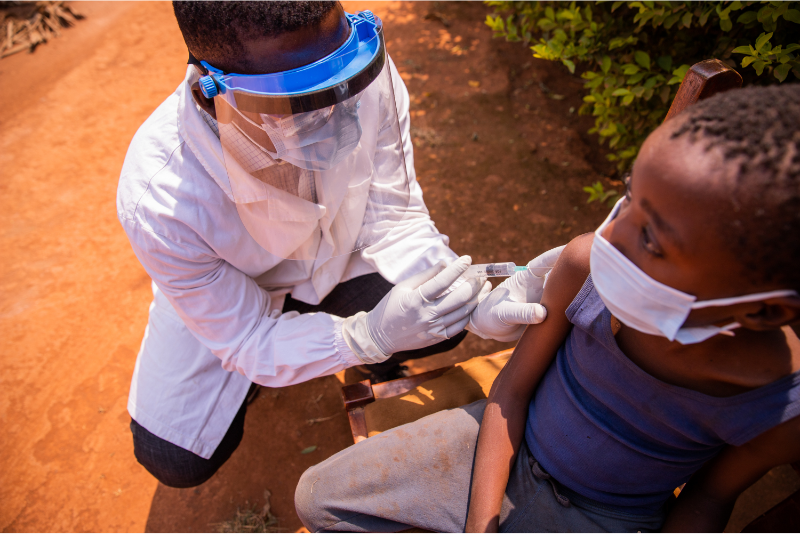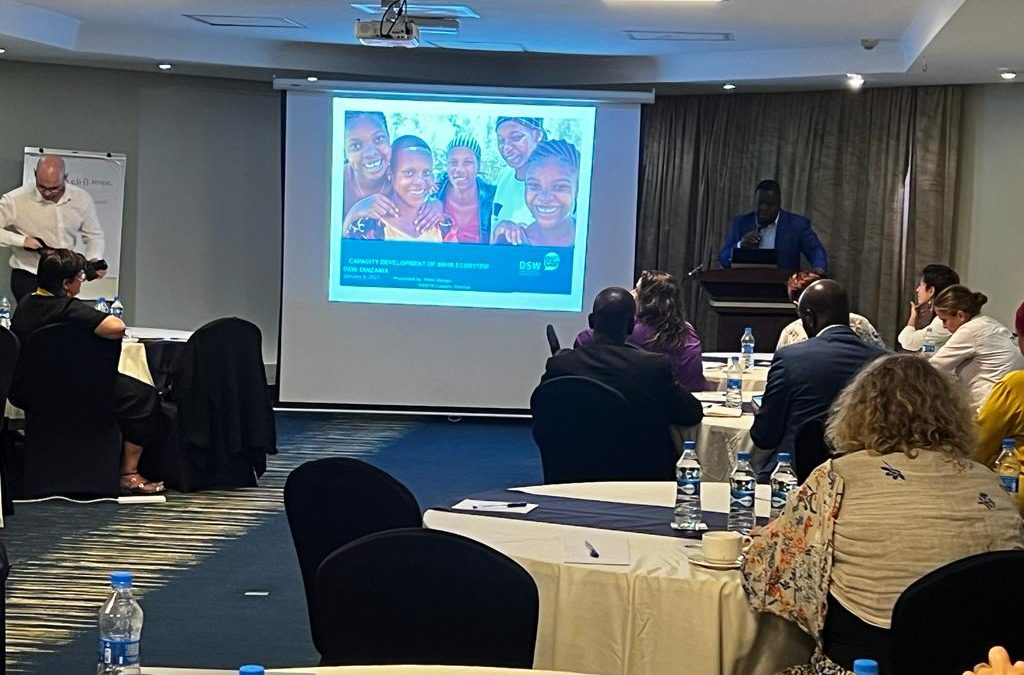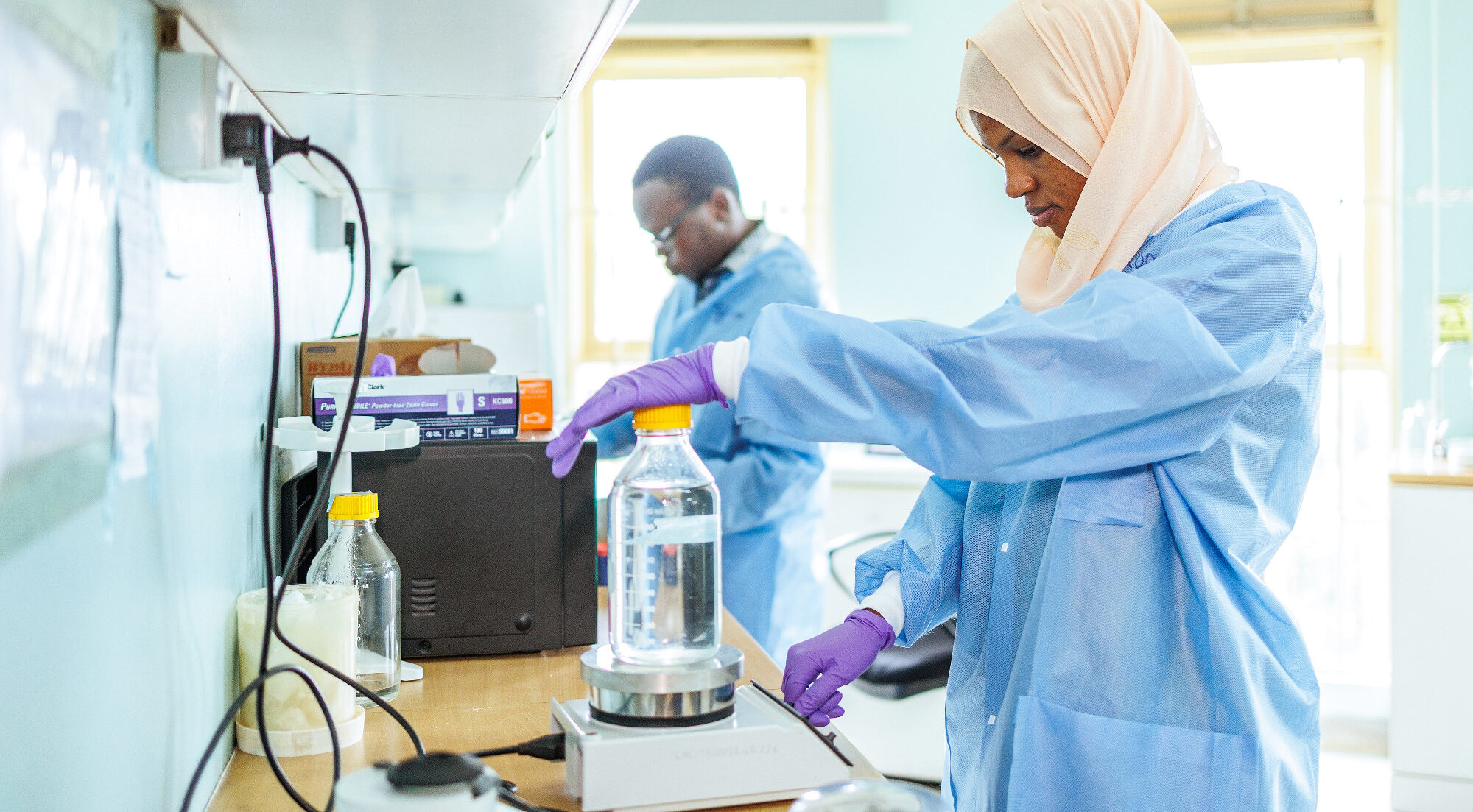
Research and Development in Global Health
Health is a human right, yet billions worldwide continue to face barriers to accessing the services they need to achieve a healthy and fulfilling life. In Africa, poverty-related and neglected diseases (PRNDs), including HIV & AIDS, tuberculosis (TB), malaria and a range of neglected tropical diseases (NTDs) exact a particularly heavy toll, with women and girls and people in marginalised situations disproportionately affected. While PRNDs impose a morally unacceptable health and socioeconomic burden on individuals and societies, investment in research, development, and innovation (R&D) in this area does not match the scale of the problem, resulting in many missing or inadequate and even unsafe tools to prevent, diagnose and treat these diseases.
How PRNDs impact the
communities we work with
Young people are vulnerable to PRNDs, with young women and girls particularly at risk. Every week, over 3000 adolescent girls and young women aged 15–24 years become infected with HIV in sub-Saharan Africa. PRNDs can trap children and young people in a vicious cycle of poverty, interfering with child growth and cognitive development; and preventing them from going to school and reaching their potential.
Often chronic, PRNDs can result in lifelong disabilities and deformities, causing stigmatisation and social exclusion. Despite the impact of PRNDs on young people, they are rarely specified as a target population for the control of these diseases, including in the development of new and improved medical tools. Take a look at our video to learn more about the changes that could help make a difference.
You are currently viewing a placeholder content from Youtube. To access the actual content, click the button below. Please note that doing so will share data with third-party providers.
More InformationWhat are PRNDs?
PRNDs stands for poverty-related and neglected diseases and refer to a group of diseases that all face disproportionately low R&D
funding relative to their burden. The group includes;
- Parasitic diseases such as hookworm, malaria and Chagas disease
- Viruses like HIV, Dengue and Chikungunya
- Bacterial infections such as tuberculosis and leprosy
- Diseases caused by toxins, such as snakebite envenoming
- Fungal infections such as chromoblastomycosis and eumycetoma
Further information in our position paper:
The result of neglect – some examples
That is important to us:
Growing awareness of
women’s health
Pervasive gender inequity in research and innovation means the unique needs of women and girls have not been taken into account in the design of the limited tools that exist for PRNDs. Women, in all their diversity, continue to be overlooked – and this is true not just for PRNDs, but for all conditions that affect them differently, disproportionately or uniquely.
Women spend 25% more time in “poor health” than men. More info
An estimated 257 million women worldwide have an unmet need for safe, reliable contraception. More info
Women account for less than a third of participants in the early stages (phase I) of clinical trials (≈22%). More info
Around 56 million girls and women in sub-Saharan Africa are at risk of female genital Schistosomiasis, a gynaecological manifestation of the neglected tropical disease schistosomiasis. More info
You are currently viewing a placeholder content from Youtube. To access the actual content, click the button below. Please note that doing so will share data with third-party providers.
More InformationAn introduction to the topic
Watch the video for an introduction to some of the changes needed to make research and innovation more gender-responsive.
What we do
Our advocacy work on
global health R&D
DSW’s advocacy to strengthen support for research and innovation in neglected areas of global health focuses on deepening investments in long-term, equitable and strategic collaborations between Europe and Africa. Looking across the product development pathway for PRNDs, from building public health institutions and clinical trials capacity to strengthening manufacturing and regulatory capacities of medical countermeasures in low- and middle-income countries with a focus on Africa, DSW applies an end-to-end approach to advocate for lasting solutions to bridge the gaps in global health research and innovation.
Gender equality in global health
DSW has long advocated for increased awareness of how PRNDs impact women and girls differently – beyond the differences in prevalence. Our PRNDs Through a Gender Lens Study informs our advocacy work on gender-inclusive research and innovation, which is expanding to include broader health areas that differently, uniquely or disproportionately impact women and girls. In line with our work promoting sexual and reproductive health and rights, we’re working to mobilise more support for research and innovation on new and improved contraceptive technologies, as the unmet need for safe and reliable contraception remains a huge challenge. From infectious disease to reproductive health and beyond, we are working with our partners and policymakers to bring our expertise on gender-responsive research and innovation to the evolving discussions on the importance of investing in women’s health.
What characterises us
How we work
Our office
in Berlin
In Berlin, we advocate for increased political and financial support from the German government for global health research and innovation with a focus on PRNDs. We are particularly committed to promoting not-for-profit research partnerships such as Product Development Partnerships (PDPs). We maintain regular contact with our APPG, prepare briefing documents and invite experts to our regular APPG meetings. In addition, we collaborate with organizations, networks and other entities to coordinate joint initiatives and events that raise awareness of the necessity for increased Global Health R&D and bridge the gap with policymakers.

Our office
in Brussels
In Brussels, we work with partners to increase the EU’s support for research and innovation into new and improved health solutions to fight PRNDs via its research framework programme Horizon Europe, and major partnerships such as the European and Developing Countries Clinical Trial Partnership (EDCTP). We prepare in-depth studies and present new policy ideas to inform relevant political discussions, including on the topic of novel pull incentives to encourage investment in PRND research and innovation. Bridging research expertise with policy making, we seek to provide opportunities for discussion between the PRND research community and EU policymakers including via dedicated workshops and high-level events.

Key Publications
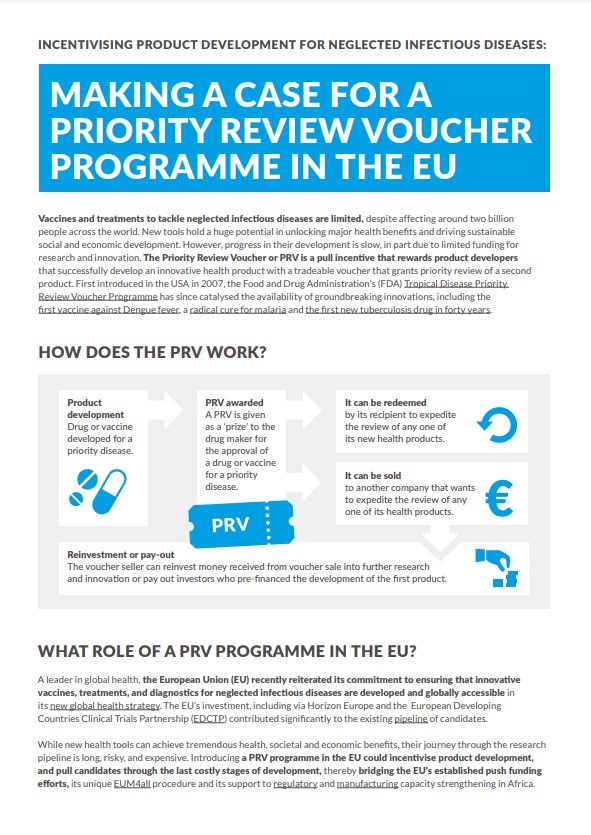
Making a case for a priority review voucher programme in the EU
Incentivising product development for neglected infectious diseases
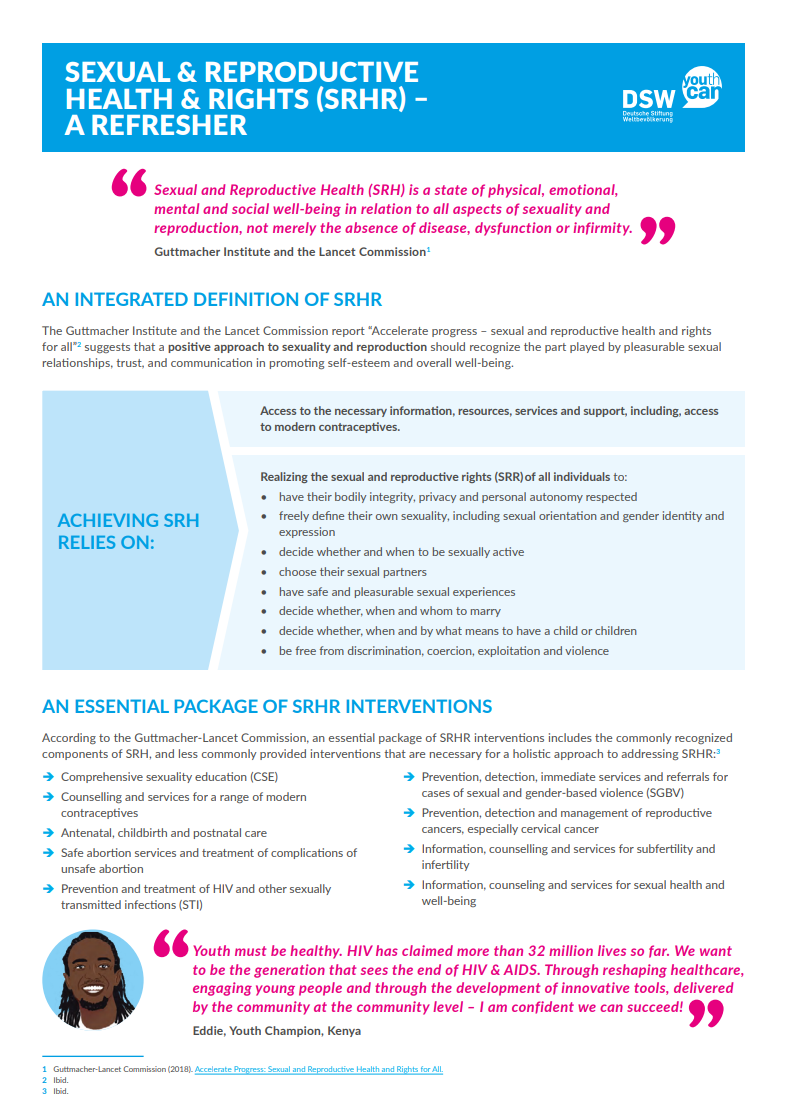
How fighting diseases of poverty
Strengthening health systems is the best way to safeguard against health crises.
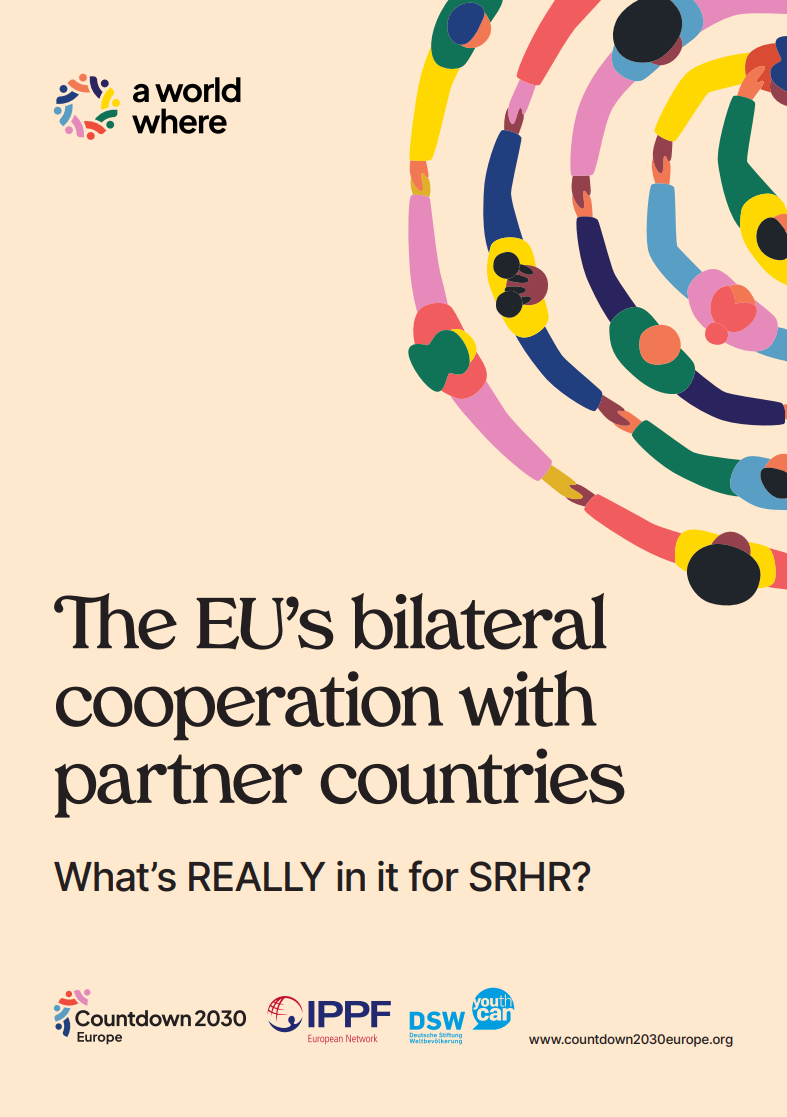
EU-Africa cooperation on epidemic preparedness and health security
Success stories and lessons learned from covid-19
Stay informed
Get the most recent and relevant information
about Global Health Research through our newsletter.
